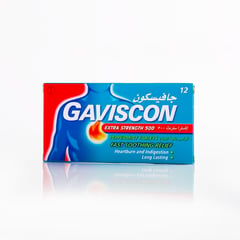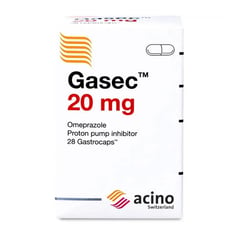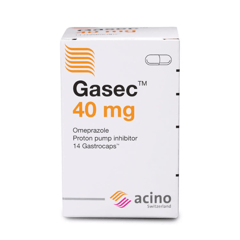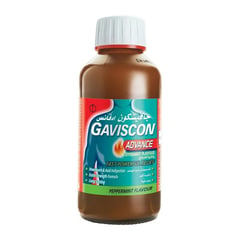What Omeprazole is used for:
Omeprazole belongs to a group of medicines called proton pump inhibitors. They work by reducing theamount of acid that your stomach produces.
Omeprazole is used to treat the following conditions:
In adults:
‘Gastro-esophageal reflux disease’ (GERD). This is where acid from the stomach escapes into the gullet (the tube which connects your throat to your stomach) causing pain, inflammation and heartburn.
Ulcers in the upper part of the intestine or stomach.
Ulcers which are infected with bacteria called ‘Helicobacter pylori’.
Ulcers caused by medicines called Non-Steroidal Anti-Inflammatory Drugs (NSAIDs). Omeprazole can also be used to stop ulcers from forming if you are taking NSAIDs.
Too much acid in the stomach caused by a growth in the pancreas (Zollinger-Ellison syndrome).
In children:
Children over 1 year of age and ≥ 10 kg
‘Gastro-esophageal reflux disease’ (GERD). In children, the symptoms of the condition can include the return of stomach contents into the mouth, vomiting and poor weight gain.
Children and adolescents over 4 years of age
Ulcers which are infected with bacteria called ‘Helicobacter pylori’.
Do not take Omeprazole:
If you are allergic to omeprazole or any of the other ingredients of this medicine.
If you are allergic to medicines containing other proton pump inhibitors.
Warnings and precautions:
Talk to your doctor or pharmacist before taking Omeprazole. Omeprazole may hide the symptoms of other diseases. Therefore, if any of the following happen to you before you start taking Omeprazole or while you are taking it, talk to your doctor straight away:
You lose a lot of weight for no reason and have problems swallowing.
You get stomach pain or indigestion.
You begin to vomit food or blood.
You pass black stools (blood-stained feces).
You experience severe or persistent diarrhea.
You have severe liver problems.
You are due to have a specific blood test (Chromogranin A).
Taking a proton pump inhibitor like Omeprazole, especially over a period of more than one year, may slightly increase your risk of fracture in the hip, wrist or spine. Tell your doctor if you have osteoporosis or if you are taking corticosteroids (which can increase the risk of osteoporosis).
Possible side effects:
Like all medicines, this medicine can cause side effects, although not everybody gets them. If you notice any of the following rare but serious side effects, stop taking Omeprazole and contact a doctor immediately: severe allergic reaction or symptoms of liver problems.
Other side effects include:
Headache
diarrhea, stomach pain
constipation, flatulence
Benign polyps in the stomach
Swelling of the feet and ankles
Disturbed sleep
Skin rash and itchy skin
feeling unwell and lacking energy
Blood problems
Low levels of sodium in the blood
Feeling agitated, confused or depressed
Taste changes
Eyesight problems such as blurred vision
Suddenly feeling wheezy
Dry mouth
An inflammation of the inside of the mouth
Liver problems
Hair loss
Skin rash on exposure to sunshine
Joint pai
Other medicines and Omeprazole:
Tell your doctor or pharmacist if you are taking, have recently taken, or might take any other medicines. This includes medicines that you buy without a prescription. This is because Omeprazole can affect the way some medicines work and some medicines can have an effect on Omeprazole.
Tell your doctor or pharmacist if you are taking any of the following medicines used for:
Fungal infection
heart problems
anxiety
epilepsy
tuberculosis
HIV infection
organ transplantation
mild depression
intermittent claudication
blood clots
cancer
How to take Omeprazole:
Always take this medicine exactly as your doctor or pharmacist has told you. Check with your doctor or pharmacist if you are not sure.
Your doctor will tell you how many capsules to take and how long to take them for. This will depend on your condition and how old you are.
It is recommended that you take your capsules in the morning.
You can take your capsules with food or on an empty stomach.
Swallow your capsules whole with half a glass of water. Do not chew or crush the capsules.
This is because the capsules contain coated pellets which stop the medicine from being broken
down by the acid in your stomach. It is important not to damage the pellets.
How to store Omeprazole:
Keep this medicine out of the sight and reach of children.
Do not use this medicine after the expiry date which is stated on the carton, bottle label or blister after EXP. The expiry date refers to the last day of that month.
Do not store above 30°C.
Store this medicine in the original package (blister) or keep the bottle tightly closed in order to protect from moisture.
Do not throw away any medicines via wastewater or household waste. Ask your pharmacist how to throw away medicines you no longer use. These measures will help protect the environment. A valid prescription should be available upon delivery
| Brand | Gasec |
|---|---|
| Shipping Type | Express |
Write Your Own Review
The largest selection of casino games and sports bets at 1xbet app.









